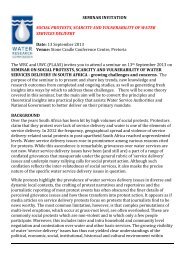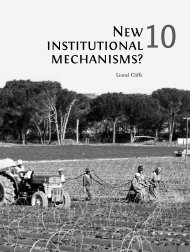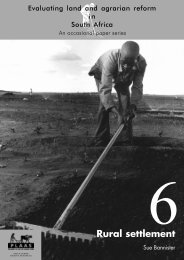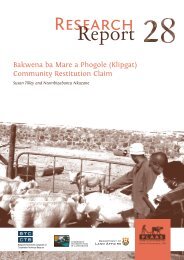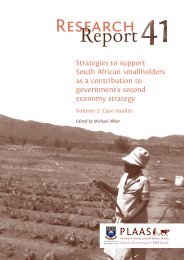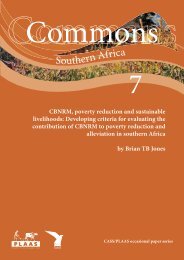A critical appraisal of South Africa's market-based land reform policy
A critical appraisal of South Africa's market-based land reform policy
A critical appraisal of South Africa's market-based land reform policy
Create successful ePaper yourself
Turn your PDF publications into a flip-book with our unique Google optimized e-Paper software.
A <strong>critical</strong> <strong>appraisal</strong> <strong>of</strong> <strong>South</strong> Africa’s<br />
<strong>market</strong>-<strong>based</strong> <strong>land</strong> <strong>reform</strong> <strong>policy</strong><br />
<strong>of</strong> projects should be handled under a<br />
different programme.<br />
It is clear from <strong>South</strong> African and international<br />
experience that <strong>land</strong> redistribution,<br />
if not part <strong>of</strong> a broader development<br />
programme accompanied by appropriate<br />
production, <strong>market</strong>ing and other support,<br />
will not bring improvements in productivity<br />
or other potential development<br />
benefits. There is no evidence that the<br />
LRAD projects are part <strong>of</strong> any wider<br />
rural development strategy, and local<br />
government, despite its development coordination<br />
mandate, is not involved in<br />
these cases at all. There have been no<br />
measures to restructure and improve<br />
access to <strong>market</strong>s or to make inputs more<br />
accessible and affordable. Some <strong>of</strong> the<br />
farmers benefit from agricultural extension<br />
services, but clearly these could be improved.<br />
Existing production has continued in<br />
cases where beneficiaries were already<br />
established on the <strong>land</strong>, but there has been<br />
no noticeable improvement in productivity.<br />
The fate <strong>of</strong> any new farmer getting access<br />
to <strong>land</strong> will be far more precarious.<br />
The LRAD programme in Limpopo<br />
reflects some <strong>of</strong> the characteristics that are<br />
<strong>of</strong>ten associated with <strong>land</strong> <strong>reform</strong>s that are<br />
not <strong>market</strong>-<strong>based</strong>, such as people accessing<br />
<strong>land</strong> ‘by virtue <strong>of</strong> political power and<br />
<strong>of</strong>ficial status, as well as granting <strong>of</strong> public<br />
<strong>land</strong> under concessional arrangements’ (El-<br />
Ghonemy 1999:108). So far, LRAD has<br />
done nothing to stimulate <strong>land</strong> <strong>market</strong>s,<br />
and has not encouraged any new investments.<br />
LRAD has not brought about any<br />
change in existing farming operations and<br />
has created no new jobs. It has produced<br />
no new, smaller-scale or more efficient<br />
farming units, and has consequently<br />
yielded none <strong>of</strong> the benefits ascribed to<br />
the <strong>market</strong>-<strong>based</strong> model. The poorer beneficiaries,<br />
some <strong>of</strong> whom may be, or aspire<br />
to be, peasant farmers, have not received<br />
sufficient <strong>land</strong> to be viable commercial<br />
enterprises and the beneficiaries who have<br />
obtained substantial <strong>land</strong> are business<br />
people or current and retired civil servants.<br />
As a <strong>market</strong>-<strong>based</strong> <strong>land</strong> redistribution programme,<br />
one would have to say that<br />
LRAD in Limpopo is a failure.<br />
LRAD is financed with public funds<br />
approved by Parliament for <strong>land</strong><br />
redistribution. The manner in which these<br />
funds have been used in Limpopo has<br />
denied much-needed resources to projects<br />
that could truly address the needs <strong>of</strong><br />
<strong>land</strong>less people and the stark racial<br />
inequality in access to <strong>land</strong>. Perhaps<br />
politicians are happy to report on the <strong>land</strong><br />
bought as if it were redistributed, creating<br />
a false impression <strong>of</strong> transformation in<br />
<strong>land</strong> access. Maybe <strong>of</strong>ficials have been<br />
excessively influenced by local elites or<br />
just taken an easier route to meeting<br />
implementation targets. Whether LRAD<br />
implementation in Limpopo has gone the<br />
route it has by accident or design, it cannot<br />
be seen as an acceptable use <strong>of</strong> public<br />
resources.<br />
Perhaps even more unfortunate than the<br />
inappropriate use <strong>of</strong> resources allocated for<br />
redistribution is the waste <strong>of</strong> an<br />
opportunity for <strong>land</strong> redistribution to<br />
become an engine for economic growth in<br />
impoverished rural areas. Empirical<br />
evidence from around the world has<br />
shown that effective <strong>land</strong> redistribution can<br />
create growth in agricultural production<br />
that can, in turn, make a substantial<br />
contribution to broader economic growth<br />
and poverty reduction. The manner <strong>of</strong><br />
LRAD implementation in Limpopo realises<br />
none <strong>of</strong> these benefits.<br />
The findings <strong>of</strong> this study show that<br />
implementation and achievements have<br />
fallen far short <strong>of</strong> the objectives <strong>of</strong> the<br />
LRAD programme and <strong>market</strong>-<strong>based</strong> <strong>land</strong><br />
<strong>reform</strong>. This leaves the question as to<br />
whether this is an experience peculiar to<br />
Limpopo or a fair reflection <strong>of</strong> national<br />
and international experience. Studies by<br />
Borras (2003) and other critics <strong>of</strong> <strong>market</strong><strong>based</strong><br />
approaches indicate that this<br />
experience may be a common one. If this<br />
is so, it is time for the promoters <strong>of</strong> LRAD<br />
and <strong>market</strong>-<strong>based</strong> <strong>land</strong> <strong>reform</strong>s to accept<br />
the need for a substantial change <strong>of</strong><br />
approach.<br />
44




